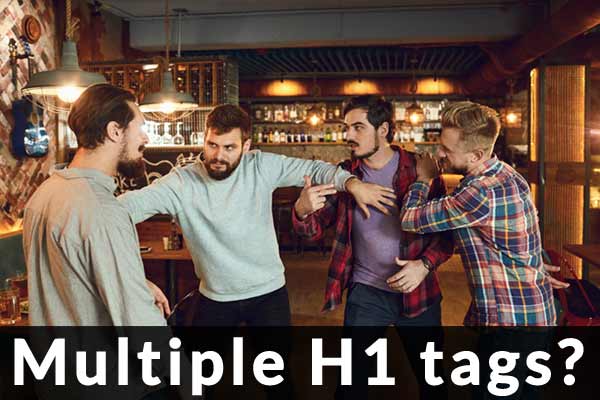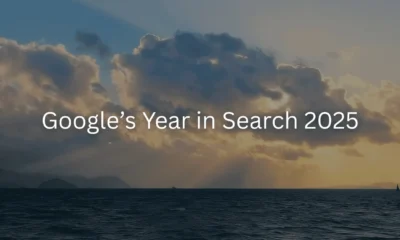SEO
H1 Headings: Over 50% of SEOs Doing it Wrong?

Recent discussions on social media indicates there is considerable disagreement in how to use Heading (H1, H2) elements. Despite guidance from Google about the use of headings the SEO industry still can’t agree about how to use headings.
An informal poll on Twitter with nearly 2,000 votes shows over half of SEOs don’t know what Google’s recommendation on headings are.
Does Google Recommend Using One H1 Heading for SEO?
Cyrus Shepard (@CyrusShepard) conducted a poll asking what Google’s guidance on multiple H1 headings were.
Surprisingly, nearly sixty percent of the respondents indicated that Google recommends just one H1 heading to a web page.
Quiz: Does Google recommend using a single <h1> in your content for SEO purposes?
— Cyrus (@CyrusShepard) May 11, 2021
Official Google Recommendation on Number of H1 Headings
Does Google recommend using one H1 heading? The answer is no.
Google’s John Mueller said in an office hours hangout that publishers are free to use as many H1 headings as they want.
John Mueller said:
“You can use H1 tags as often as you want on a page. There’s no limit, neither upper or lower bound.
Your site is going to rank perfectly fine with no H1 tags or with five H1 tags.”
Google has even published a video on this specific topic to dispel the idea that Google recommends only one H1.
In the video John Mueller says:
“Our systems don’t have a problem when it comes to multiple H1 headings on a page. That’s a fairly common pattern on the web.”
SEOs Can’t Agree on Proper Use of Headings
Anecdotal evidence from online discussions in Facebook SEO groups also show that there is wide disagreement on the proper use of headings. Some in the SEO industry cling to ideas that date back to the early 2000’s. Others state that John Mueller’s statements aren’t entirely true.
The topic of heading tags is so basic yet despite numerous clarifications from Google the topic remains extremely polarizing.
Heading Tag SEO is a Contentious Topic Online

SEOs Say H1 Tag More Important than H2, H3, etc.
Some in the SEO industry will admit that Mueller said it’s okay to use more than one H1. But they will also insist that an H1 element is more important than an H2.
That used to be true back in the very early 2000’s. It’s not true anymore.
Early Google Used Clues to Understand Web Pages
In the early 2000’s Google used headings as a clue to what a web page was about.
Google also regarded content at the top of the web page as more important because it gave another clue as to what a web page is about, since that’s where writers often state what the web page is about.
Words that were written in bold, italics and written in bigger fonts (using the old HTML 4 Font tag) were also regarded as clues as to what the web page was about, way back in the early 2000’s.
Some of these ranking factors were a part of the original Google PageRank research paper published in 1998 and in later research papers and revealed by Googlers in statements.
The point is that headings and other elements were used as clues as to what a web page is about. Google arguably began moving away from looking for clues to what a web page was about in 2012.
That’s the date that Google announced a new direction toward understanding what things are by using a Knowledge Graph.
The knowledge graph gave Google a deeper understanding of what things are so that it could move away from looking for clues in sequences of words (strings of data).
Google announced this in an article titled, Introducing the Knowledge Graph: Things, Not Strings.
Google’s announcement said:
“This is a critical first step towards building the next generation of search, which taps into the collective intelligence of the web and understands the world a bit more like people do.”
After the Google Hummingbird update announcement in September 2013 Google began a transition toward a more natural language style of understanding content and search queries.
In a September blog post Google announced that you could now do comparisons between objects by speaking to the Google Search App and other interesting things that relied more on knowledge of what things are and less on clues about what they are.
That was eight years ago and natural language processing has progressed so far that Google doesn’t rely on clues to guess what a page is about.
In 2021 Google can understand what the topic is about and relate it to a search query.
That’s wildly more sophisticated than matching search query keywords to keywords on a web page.
And that is why Google’s Mueller has been telling the SEO community that it doesn’t matter how many H1’s you use. The only purpose that a heading has is to communicate what a section of content is about. That’s it.
The old 2001 way of giving Google a clue with keywords, that’s a thing of the past. Google doesn’t do exact match keywords in the search results anymore because natural language and AI technologies allow Google to understand what a page is about, especially if it’s well structured with the proper use of heading elements.
No Magic Ranking Power to an H1 Tag
John Mueller’s statement expressly says that a site will rank fine without an H1 or with five H1s. That means there is no extra importance given to an H1.
Mueller also stated in another Office-hours Hangout that a page will rank fine if you use an H2 or an H1, that they could be used interchangeably.
In response to this question:
“A page without an H1 title will it still rank for keywords which is in the H2 title”
John Mueller answered:
“Of course.
…Will it still? I don’t know if it will still but it can. It can absolutely.”
Mueller went on to say that headings on a page (not just H1 but headings) help tell Google what that section of content is about.
Mueller stated:
“So headings on a page help us to better understand the content on the page.
Headings on the page are not the only ranking factor that we have.
We look at the content on its own as well.
But sometimes having a clear heading on a page gives us a little bit more information on what that section is about.”
Heading tags continue to be a strong signal of what a section of content is. Read: Google: Heading Tags are a Strong Signal
Headings Used to Help for Ranking Keywords
Back around 2001 to 2005 there used to be a keyword ranking bonus with heading tags. It was necessary to use keywords in the headings. That was in the early 2000s.
Yet for some reason this particular habit of regarding H1 as extra important continues even though we are in the age of AI and Natural Language Processing.
Do some searches in Google and you’ll see that that kind of thing doesn’t matter anymore. You’ll see that the top ranked sites are ranked because they are relevant for the topic, not because they have an exact match keyword phrase in their heading tags.
So to finish up, what’s important is to accurately describe what the topic of the article is with your headings and to use headings to provide a description of what a section of content is about.
This will help Google to better understand the content because in 2021 Google doesn’t rank exact match keywords the way it used to in 2001 (I know because I was doing SEO in 2001).
Today Google is ranking content, not keywords. It pays to think of the entire page in terms of “What is this about?” and each section as to how it relates to that overall topic.



![How AEO Will Impact Your Business's Google Visibility in 2026 Why Your Small Business’s Google Visibility in 2026 Depends on AEO [Webinar]](https://articles.entireweb.com/wp-content/uploads/2026/01/How-AEO-Will-Impact-Your-Businesss-Google-Visibility-in-2026-400x240.png)
![How AEO Will Impact Your Business's Google Visibility in 2026 Why Your Small Business’s Google Visibility in 2026 Depends on AEO [Webinar]](https://articles.entireweb.com/wp-content/uploads/2026/01/How-AEO-Will-Impact-Your-Businesss-Google-Visibility-in-2026-80x80.png)













